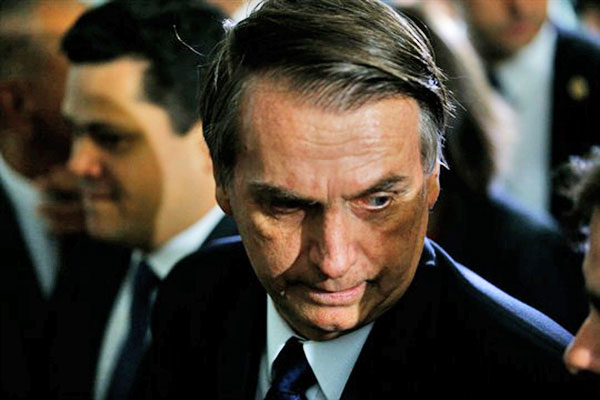|
by Frida Ghitis arrives at the National Congress in Brasilia, Brazil, Feb. 20, 2019 (Photo by Dida Sampaio for Agencia Estado via AP Images).
It was plainly visible behind the laughter and the music, in many of the costumes and chants targeting President Jair Bolsonaro and his administration, which is less than three months old.
But while the crowds were
expressing concerns about the new far-right government, their
message was also a sign of how much Bolsonaro has stumbled out of
the gate.
They dressed in costumes with political symbols aimed at highlighting the early appearance of alleged corruption in Bolsonaro's inner circle.
Brazil's hard-line president, who won last year's election by vowing to uproot corruption, revive the economy and dispense with politically correct policies, is already facing charges of nepotism, and his administration is caught up in graft scandals.
Relations with Brazil's
Congress are brittle, and there are troubling signs of renewed
unrest in protected indigenous areas of the country.
One reason why is that a
major source of this trouble is Bolsonaro's own family.
But the problem goes
beyond their participation in major policy decision-making, hiring
and firing of top personnel, and stoking Bolsonaro's base on social
media.
In early December, it was revealed that a government financial activities investigation had its sights on the newly elected senator.
The younger Bolsonaro was
suspected of using his aide, Fabricio Queiroz, as a conduit
for illicit transactions. One of the payments was made to First
Lady Michelle Bolsonaro.
At the request of the senator's lawyer, the Supreme Court initially ordered prosecutors to suspend their investigation, citing the legal protections enjoyed by legislators.
The investigation was
temporarily suspended but later resumed after officials concluded
the court was not entitled to stop the process.
Making matters worse, the stench of corruption reached Bolsonaro's party within weeks of his inauguration, in a different scandal made much worse by Carlos Bolsonaro, another one of the president's sons.
It ended in the first
Cabinet dismissal of his presidency.
Bebianno had helped run Bolsonaro's presidential campaign and had served as head of his Social Liberal Party, or PSL. The Brazilian daily, Folha de Sao Paulo, reported that Bebianno had run a scheme setting up dummy candidates in order to divert funding to companies supporting the PSL.
In the aftermath of the report, Bebianno said he had discussed the matter over the phone with the president, who was hospitalized when the scandal broke.
Bolsonaro was having a procedure after an assassination attempt during a campaign rally. Carlos Bolsonaro went on Twitter to attack Bebianno, accusing him of lying about talking to the president.
Because of this public spat, the scandal exploded into something much bigger.
A week later, and still
less than 50 days into his administration, the president fired
Bebianno, replacing him with yet another general in a Cabinet
dominated by military men.
On the campaign trail, Bolsonaro likened indigenous peoples to animals living in zoos, vowing to end restrictions on commercial activity on their protected lands. Just after his inauguration, land invasions by armed men surged; they are up 150 percent since the election, according to the Indigenous Missionary Council.
Commercial developers
have already sent armed men to take over territory, firebombing a
school and a health post, clashing with indigenous tribes, and
prompting some tribal groups to arm themselves in preparation for
more expected violence.
The president's party holds a minority in the legislature and has not managed to build a majority coalition in a Congress divided among 30 parties.
In a spectacular rebuke of the president, the Chamber of Deputies, the lower house of Congress, voted by an overwhelming margin to block an executive order from Bolsonaro that would have greatly expanded the government's ability to designate documents as secret and keep them out of the public sphere.
The vote was 367 to 57
against the president.
Justice Minister Sergio Moro, highly respected for his role in uncovering the vast Car Wash corruption scheme, has introduced a major anti-crime bill. And Economy Minister Paulo Guedes, surrounded by a largely technocratic staff, has presented to Congress a proposal for major pension reform.
Economists agree that
Brazil urgently needs to overhaul its pension system and bolster its
fiscal position.
Guedes is reportedly
worried that the administration is ineptly handling the effort to
push the proposal through Congress.
But the evidence so far
suggests Bolsonaro's supporters have reasons for concern too...
|


